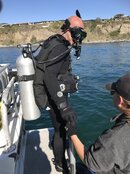I can't imagine learning to dive in Southern California and not knowing how to do beach dives.
I agree and disagree with this.
I've been teaching diving in SoCal since 1981. Obviously, the overall goal is to get you to a point where you're comfortable in the water and also where you'll want to keep diving once you're certified. Beach diving poses an interesting challenge from the standpoint of fulfilling those goals.
Also remember some reasons dive shops do beach dives as part of their basic class: Easy, cheap, and quick. It's easier to get people to a beach than it is to purchase boat spots. Beach diving might "cost" parking and not much else so it doesn't drive up the apparent cost of your class. And you can get it done in half a day so an instructor who's also a store employee can go back and work in the store for the afternoon. All good reasons perhaps, but reasons that serve the needs of the instructor & store rather than the student diver.
For those of you certified in SoCal, think back to your first beach dive in your OW class. Show of hands if it was a positive, empowering experience for you. Hmmmm, not many hands up.
Show of hands if you were at least a little nervous (if not downright scared), might have lost some gear, gotten separated from the instructor or class, gotten tossed around in the surf, saw someone get hurt or get sick, etc. Hmmm, a number of hands up.
Personally, I have never considered beach diving to be a basic entry-level-diver skill. I have also never considered beach diving to be the first thing you should be exposed to in the open water. Again, my philosophy was that I want you to have positive experiences and the more of those I can build in, the better-prepared you'll be once certified and the more eager you'll be to continue diving with or without me.
I have always felt it was counter-productive to make the first OW experience a beach entry due to the negatives mentioned above. I think we lose a lot of people that way in that they either drop out or don't continue diving after their card is issued. In fact, when we had Reef Seekers open as a brick-and-mortar, the instructors were prohibited from making the first dive a beach entry. First one was always to be Avalon in the UW Park. Once those were under your belt, they could do a beach if they wanted to along with a boat.
In fact when I was actively teaching basic classes back in the good old days, my standard pattern was that on the first Saturday we did three snorkel-only dives at Malaga Cove (granted a beach, but no scuba and the point was to let them get knocked around a bit and make it fun), following day was Sunday in the Avalon UW Park where we usually did a quick snorkel with rescue drills plus up to three scuba dives (two of which were "official"), next Saturday was a single-dive beach entry at Corral Canyon (and if they didn't do it well or they didn't enjoy it, it was no big deal since we had a successful and fun Avalon day under our belt, and then that Sunday was a boat dive where we'd do at least two and perhaps as many as four scuba dives. So by the end of the class, you might have done as many as 8 scuba dives along with 4 snorkel dives. Plus we offered a 2-day Beach Diving class after you were certified.
So I agree that beach diving is a skill that should be taught but with the caveat that it's not for everyone. My own personal estimate is that 70-80% of the divers who get certified in SoCal do breach dives in their basic class and then never do another beach dive their entire diving career. So why should something that they're never going to do again, and which also has many negative potentials that can actually turn them off the sport, be considered an essential basic skill? There's plenty of time to learn how to beach dive (and really the only additional skill is entry/exit - once you've done that, going down is going down) once you're certified and it should be something you approach with eager anticipation, not something you might dread with trepidation.
- Ken




